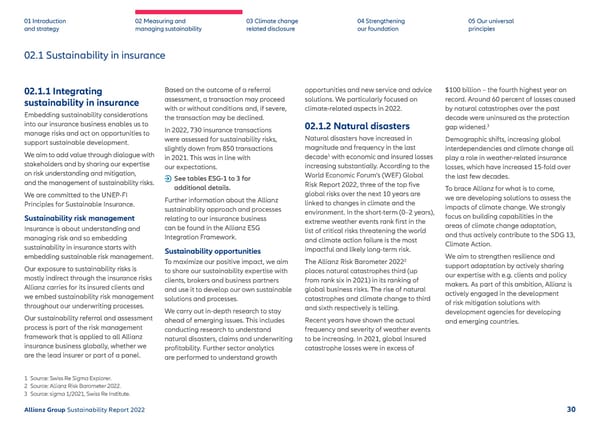01 Introduction and strategy 02 Measuring and managing sustainability 03 Climate change related disclosure 04 Strengthening our foundation 05 Our universal principles 02.1.1 Integrating sustainability in insurance Embedding sustainability considerations into our insurance business enables us to manage risks and act on opportunities to support sustainable development. We aim to add value through dialogue with stakeholders and by sharing our expertise on risk understanding and mitigation, and the management of sustainability risks. We are committed to the UNEP-FI Principles for Sustainable Insurance. Sustainability risk management Insurance is about understanding and managing risk and so embedding sustainability in insurance starts with embedding sustainable risk management. Our exposure to sustainability risks is mostly indirect through the insurance risks Allianz carries for its insured clients and we embed sustainability risk management throughout our underwriting processes. Our sustainability referral and assessment process is part of the risk management framework that is applied to all Allianz insurance business globally, whether we are the lead insurer or part of a panel. Based on the outcome of a referral assessment, a transaction may proceed with or without conditions and, if severe, the transaction may be declined. In 2022, 730 insurance transactions were assessed for sustainability risks, slightly down from 850 transactions in 2021. This was in line with our expectations. See tables ESG-1 to 3 for additional details. Further information about the Allianz sustainability approach and processes relating to our insurance business can be found in the Allianz ESG Integration Framework. Sustainability opportunities To maximize our positive impact, we aim to share our sustainability expertise with clients, brokers and business partners and use it to develop our own sustainable solutions and processes. We carry out in-depth research to stay ahead of emerging issues. This includes conducting research to understand natural disasters, claims and underwriting profitability. Further sector analytics are performed to understand growth 02.1 Sustainability in insurance opportunities and new service and advice solutions. We particularly focused on climate-related aspects in 2022. 02.1.2 Natural disasters Natural disasters have increased in magnitude and frequency in the last decade 1 with economic and insured losses increasing substantially. According to the World Economic Forum’s (WEF) Global Risk Report 2022, three of the top five global risks over the next 10 years are linked to changes in climate and the environment. In the short-term (0–2 years), extreme weather events rank first in the list of critical risks threatening the world and climate action failure is the most impactful and likely long-term risk. The Allianz Risk Barometer 2022 2 places natural catastrophes third (up from rank six in 2021) in its ranking of global business risks. The rise of natural catastrophes and climate change to third and sixth respectively is telling. Recent years have shown the actual frequency and severity of weather events to be increasing. In 2021, global insured c atastrophe losses were in excess of $100 billion – the fourth highest year on record. Around 60 percent of losses caused by natural catastrophes over the past decade were uninsured as the protection gap widened. 3 Demographic shifts, increasing global interdependencies and climate change all play a role in weather-related insurance losses, which have increased 15-fold over the last few decades. To brace Allianz for what is to come, we are developing solutions to assess the impacts of climate change. We strongly focus on building capabilities in the areas of climate change adaptation, and thus actively contribute to the SDG 13, Climate Action. We aim to strengthen resilience and support adaptation by actively sharing our expertise with e.g. clients and policy makers. As part of this ambition, Allianz is actively engaged in the development of risk mitigation solutions with development agencies for developing and emerging countries. 1 Source: Swiss Re Sigma Explorer. 2 Source: Allianz Risk Barometer 2022 . 3 Source: sigma 1/2021, Swiss Re Institute. Allianz Group Sustainability Report 2022 30
 Sustainability Report 2022 | Allianz Page 30 Page 32
Sustainability Report 2022 | Allianz Page 30 Page 32